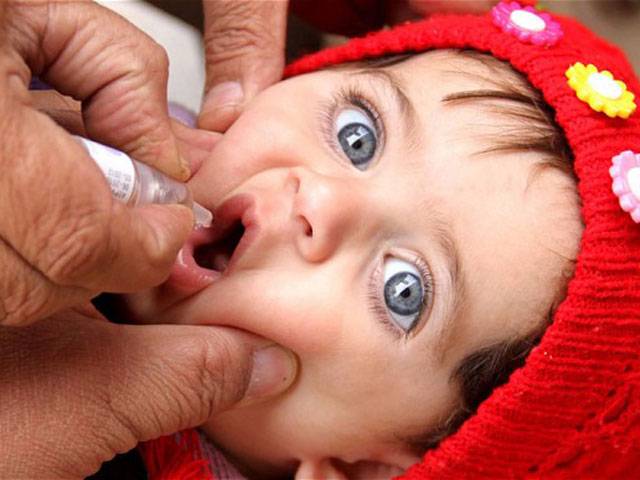KARACHI - Despite the dramatic drop in polio cases last year, the threat of continued transmission due to funding and immunization gaps has driven the Global Polio Eradication Initiative (GPEI) to launch an Emergency Action Plan.Full implementation of the Emergency Action Plan (EAP) is currently hindered by a critical funding gap of nearly US$1 billion through 2013, said a communication received on Sunday.By some estimates, failure to eradicate polio could lead within a decade to as many as 200,000 paralyzed children a year worldwide.Already, funding shortages have forced the GPEI to cancel or scale-back critical vaccination activities in 24 high-risk countries, leaving more children vulnerable to contracting the disease, and exposes polio-free countries to the risk of re-emergence. This is in a scenario where once achieved, polio eradication would generate net benefits of US $40-50 billion globally by 2035, with the bulk of savings in the poorest countries, calculated based on investments made since the Global Polio Eradication Initiative (GPEI) was formed and savings from reduced treatment costs and gains in productivity.Although the number of polio cases was lower in the first four months of this year than during the same period in any other year, cases continue to occur in Nigeria, Pakistan, Afghanistan, and Chad.Outbreaks in recent years in China and West Africa due to importations from Pakistan and Nigeria, respectively, highlight the continued threat of resurgence. Interestingly polio eradication activities resulted in several landmark successes in 2010-2012. India, long-regarded as the nation facing the greatest challenges to eradication, was removed from the list of polio-endemic countries in February 2012. Outbreaks in previously polio-free countries were nearly all stopped.Since 1988 (the year the GPEI was launched), the incidence of polio has been reduced by more than 99% In 1988, more than 350,000 children were paralyzed each year in more than 125 endemic countries. In 2012, 55 cases have been reported (as of 15 May 2012), and only three countries remain endemic: Nigeria, Pakistan and Afghanistan.KU to release bio-pesticides for farmers: For the first time in Pakistan, National Nematological Research Centre (NNRC), University of Karachi will release nematode samples to local growers and farmers which will replace pesticides. Nematodes are small parasitic animals that can kill bacteria without leaving any harmful impact on crops, this has been announced in a three day workshop titled Biological Control of Root-knot Nematode in Vegetables using EPN organized by the National Nematological Research Centre, University of Karachi. The workshop, inaugurated by Prof. Dr Muhammad Qaiser, Vice Chancellor KU, concluded on the note that excessive use of pesticides in crops leaves harmful impacts.There impacts are harmful for health and lead to severe diseases. In order to deal with this situation, use of nematodes can be extremely fruitful. The aim of this workshop was to spread awareness, and improve skills of participating farmers, extension workers and students on EPN technologies developed by NNRC for the biological control of RKN in vegetables. About 60 participants from Agriculture College, Multan, Ayub Agriculture Research Institute (AARI) Faisalabad, Agriculture Research Institute Tandojam (ARI), Agriculture Training Institute Sakrand, (ATI) Sindh, Directorate of Agriculture Extension Hyderabad, Office of Agriculture Extension Tando Allahyar, Office of Agriculture Extension Mirpurkhas, Sindh, Agriculture University, Tandojam (SAU), Agriculture University of Faisalabad (AUF), progressive growers and representative of Sindh Chamber of Agriculture and Sindh Abadgar Board also participated in the workshop. Dr M A Maqbool, former Director, National Nematological Research Centre KU, in his speech applauded the effort made by the staff and students of National Nematological Research Centre to hold the International Workshop for transfer of technology of biological management to farmers in a befitted manner.
Thursday, April 18, 2024
Global polio eradication faces funds paucity

Stefanos Tsitsipas advances in Barcelona
4:19 PM | April 18, 2024
Met Office predicts more rains across country till April 29
2:51 PM | April 18, 2024
Punjab changes school timings for summer season
1:55 PM | April 18, 2024
Enemies of Pakistan are unable to digest investment in the country: Ataullah Tarar
1:29 PM | April 18, 2024
IHC restores Bushra Bibi's appeal for shifting to Adiala Jail from Bani Gala
1:24 PM | April 18, 2024
Hepatitis Challenge
April 18, 2024
IMF Predictions
April 18, 2024
Wheat War
April 18, 2024
Rail Revival
April 17, 2024
Addressing Climate Change
April 17, 2024
Justice denied
April 18, 2024
AI dilemmas unveiled
April 18, 2024
Tax tangle
April 18, 2024
Workforce inequality
April 17, 2024
New partnerships
April 17, 2024
ePaper - Nawaiwaqt
Advertisement
Nawaiwaqt Group | Copyright © 2024





